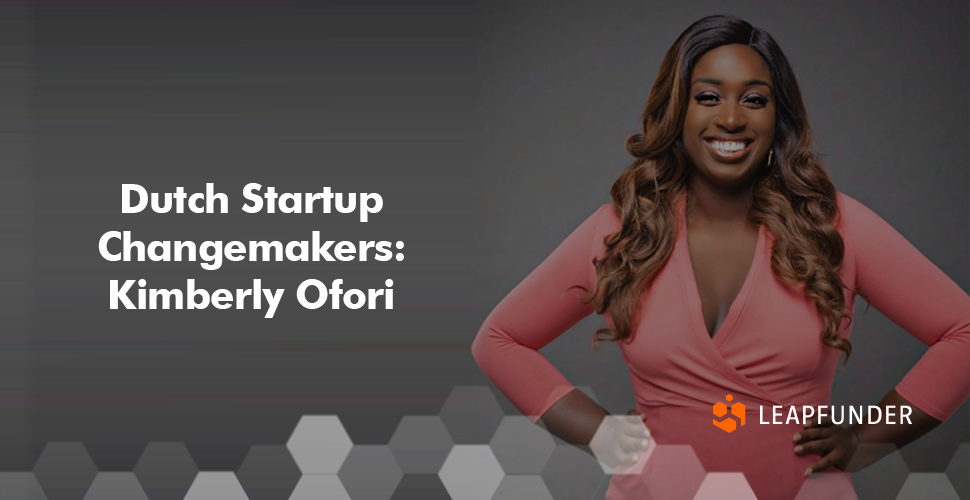Kimberly Ofori, the Managing Director of Ofori & Company, a strategy innovation & business model design agency, climbed up the career ladder starting at a very young age, worked and lived in the Middle East, Africa and Europe and founded & sold two companies. Find out what is it about entrepreneurship that particularly attracts her, how she’s helping women in tech in the Netherlands and what advice for founders she shared with us.

1. Hi Kimberly, thank you for agreeing to do the interview. Could you tell us a bit about your background and how you first entered the startup world? What is it about entrepreneurship that attracts you?
I come from a corporate background. I have worked for multinationals in the Insurance industry and in Banking as a Wealth Manager before I moved to Dubai where I worked as a Consultant. It was when I moved to Spain that I got introduced to entrepreneurship. I founded my first two businesses there. One was not such a successful retail business, but the other, an AI-backed recruitment platform, turned out to be quite successful and I ended up selling that company to a bigger local recruitment company.
Once I landed back in the Netherlands, I founded Apreneur, a social networking platform for African Entrepreneurs in Africa and in the Diaspora. My intention at the time was to create a small community of tech founders that would have access to a rich network, tools and resources, as well as a place for investors to find and connect with promising ventures. The platform ended up attracting thousands of loyal members and in 2019, I sold the IP to a US investor.
It was after I moved on from Apreneur, that I realised I had a unique eye for spotting opportunities to solve problems by leveraging platforms and I have continued to develop and co-create several platform solutions after that.
2. You’re the Managing Director of Ofori & Company, the value creation agency. With a team of innovation entrepreneurs and multi-industry experts, you support corporates & startups with defining new value propositions and positioning their competitive edge. Tell us more about your mission.
One of the biggest lessons I learned from entrepreneurship and scaling businesses is that 1) execution is king, 2) you can’t win at execution without a smart and solid strategy and 3) having a deep understanding of your customer needs today and what brings value to them is more important than ever before. As much as that sounds logical now, I have come to find out (and there are quite a few studies proving this) that many businesses fail because of the lack of the above.
On the other side, many corporations struggle with business model innovation and launching successful new product lines because they have lost touch with these very same things, causing them to increasingly lose market share to up and coming companies who are more agile, lean and customer-focused.
At Ofori & Co. we focus specifically on (re)-engaging founders and leadership teams on looking outside of the norm again when it comes to defining what makes them uniquely valuable in ever-growing competing markets. We also have a strong hand in the execution once we have defined new opportunities for growth with an ‘out of the box’ strategy.
3. One of your main focuses is currently Frontline Incubator. Together with a team of industry experts and experienced entrepreneurs you work to bring women-led innovative and disruptive tech companies to life. What is it about scaling and innovation that particularly attracts you?
I have always been one to question what is, and what isn’t – followed by the why. I believe strongly in challenging the status quo and doing things differently, it’s been the theme of my life so far and if you dig a bit deeper into my background, it shows.
When looking at the state of technology and innovation today, you can’t help but be excited about the endless possibilities and opportunities it presents to not only make life more comfortable for many people but to really make a difference in the lives of millions. It’s why I will always choose to support a company that can leverage innovation and technology to do good on a large scale, and make better over a potentially more profitable consumer solution.
I am especially excited about the next decade in tech because I believe technology could become the great equalizer for many (ethically), even entire continents as we are increasingly seeing across the border if we do it right.
4. You’re the Chairwoman of the Board at Voice of All Women, an organisation committed to women’s rights. How will you be helping women in tech in the Netherlands?
VOAW is committed to the emancipation, participation, autonomy, and agency of women and girls from marginalized communities. VOAW aims to contribute to an inclusive, safe, and healthy society and believes that the equal position/treatment of women is a crucial aspect of such a society.
Supporting (young) women to become more digitally literate and supporting careers in the technology field where we can, will definitely be one of the things I aim to work on – as it goes hand in hand with our mission to enable more women to stand on their own two feet within the new environment they find themselves here in the Netherlands.
5. You founded multiple brands and companies over the past decade ranging from digital platforms, human resource solutions to lifestyle brands. You also coach 3rd and 4th year student-entrepreneurs on strategy and execution, visioning and business best practices. What are the top three lessons for entrepreneurs you’d like to share with our readers?
Over the past few decades or so, entrepreneurship has been glamorized and pushed as this easier, faster way to wealth and freedom. The truth is, nothing can be further from the truth. Entrepreneurship is hard, successfully running a business is hard, managing people and building a team that can take your company to the next level – many founders will agree – is perhaps the hardest part of it all. There is a reason the majority of newly found businesses fail within the first 5 years of their existence, and even fewer are able to scale.
So instead of chasing the fame and fortune, that may or may not come while you embark on this journey, do this:
- Build something that people actually want, ideally something they really need
- Bootstrap your business for as long as you can – let your customers be your first investors. Not only does it make you a better money manager who understands every aspect of his/her business, but it also puts you in a much more favourable position when you are ready to scale with the help of a financial injection
- Hire the right people and treat them right. Probably the most underestimated part of a business – the people who make the magic happen. People can make or break your business, being on the frontlines or being the brains that fuel your innovation for instance. Invest in hiring the right people, and then invest in them some more. Some of the most successful companies in the world were first just a team of really great people whose work was valued.
6. What do you think are the next big things in the startup world? What do you predict for the startup ecosystem in the Netherlands in the near future?
I see an interesting shift happening on a global scale as well as in the Dutch ecosystem around solving real-world problems in a sustainable way. Tech for Good is no longer put aside as unprofitable or charity – and is taken much more seriously as the numbers are showing this generation and the next, demand better, cleaner and more sustainable solutions for their everyday consumption.
Big things are happening in Food Innovation & Agriculture as we move to answer the questions that are feeding the planet more sustainably over the next 100 years, but also HealthTech and FinTech are going to become even more important as we move towards a more inclusive future with solutions that benefit us all.
Thanks a lot for sharing your story and insights with us, Kimberly. We wish you the best of luck in your future endeavours.
Join our network of startups & investors!


